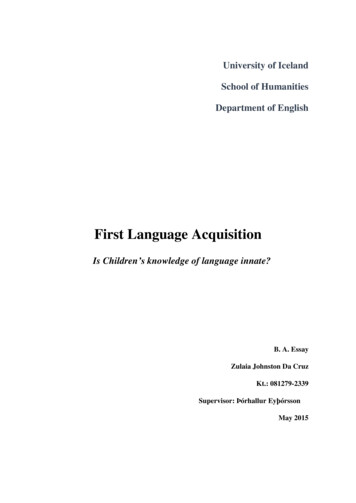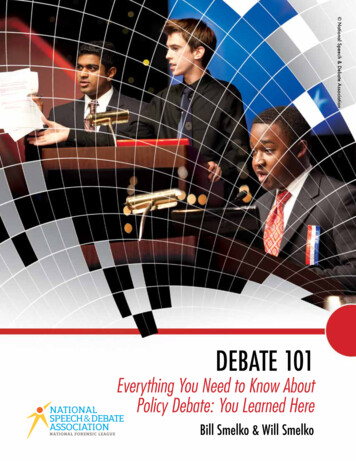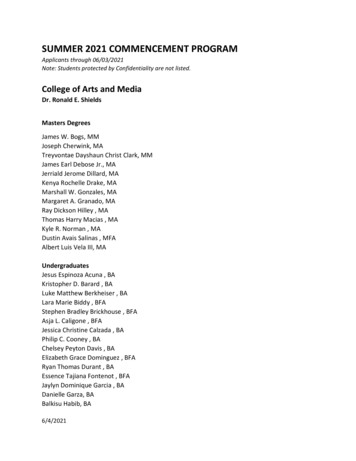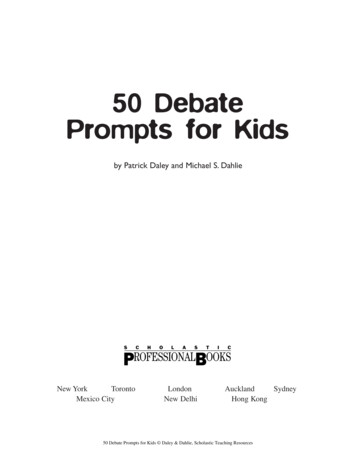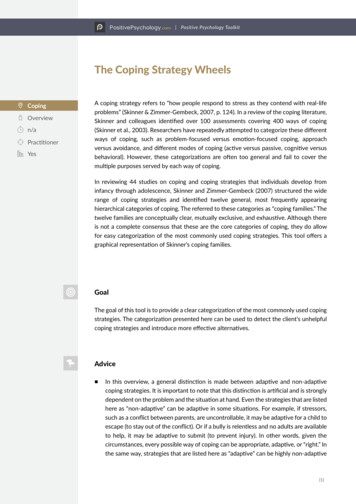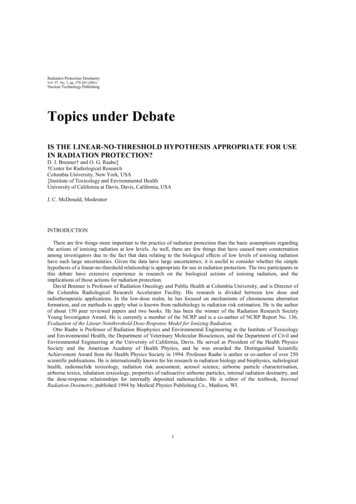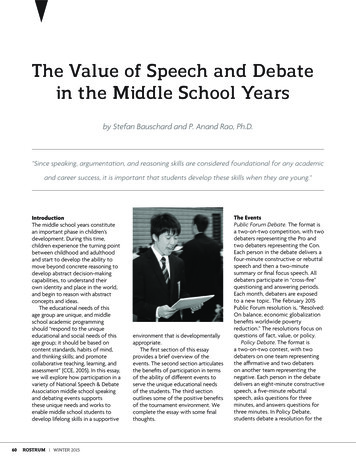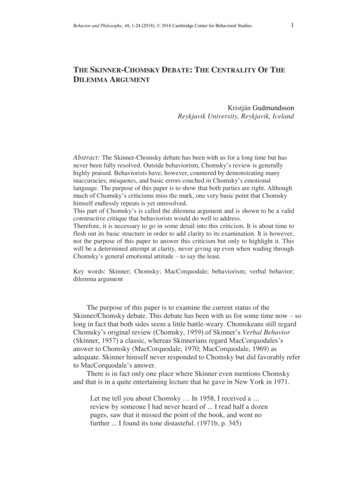
Transcription
Behavior and Philosophy, 46, 1-24 (2018). 2018 Cambridge Center for Behavioral Studies1THE SKINNER-CHOMSKY DEBATE: THE CENTRALITY OF THEDILEMMA ARGUMENTKristján GudmundssonReykjavik University, Reykjavik, IcelandAbstract: The Skinner-Chomsky debate has been with us for a long time but hasnever been fully resolved. Outside behaviorism, Chomsky’s review is generallyhighly praised. Behaviorists have, however, countered by demonstrating manyinaccuracies, misquotes, and basic errors couched in Chomsky’s emotionallanguage. The purpose of this paper is to show that both parties are right. Althoughmuch of Chomsky’s criticisms miss the mark, one very basic point that Chomskyhimself endlessly repeats is yet unresolved.This part of Chomsky’s is called the dilemma argument and is shown to be a validconstructive critique that behaviorists would do well to address.Therefore, it is necessary to go in some detail into this criticism. It is about time toflesh out its basic structure in order to add clarity to its examination. It is however,not the purpose of this paper to answer this criticism but only to highlight it. Thiswill be a determined attempt at clarity, never giving up even when wading throughChomsky’s general emotional attitude – to say the least.Key words: Skinner; Chomsky; MacCorquodale; behaviorism; verbal behavior;dilemma argumentThe purpose of this paper is to examine the current status of theSkinner/Chomsky debate. This debate has been with us for some time now – solong in fact that both sides seem a little battle-weary. Chomskeans still regardChomsky’s original review (Chomsky, 1959) of Skinner’s Verbal Behavior(Skinner, 1957) a classic, whereas Skinnerians regard MacCorquodales’sanswer to Chomsky (MacCorquodale, 1970; MacCorquodale, 1969) asadequate. Skinner himself never responded to Chomsky but did favorably referto MacCorquodale’s answer.There is in fact only one place where Skinner even mentions Chomskyand that is in a quite entertaining lecture that he gave in New York in 1971.Let me tell you about Chomsky In 1958, I received a review by someone I had never heard of . I read half a dozenpages, saw that it missed the point of the book, and went nofurther . I found its tone distasteful. (1971b, p. 345)
GUDMUNDSSON2Skinner (1971) adds:Ironically, Chomsky was later invited to give the John LockeLectures at Oxford. I was at Cambridge University at the time,and the BBC thought it would be interesting if we were todiscuss our differences on television. I don’t know what excuseChomsky gave, but I agreed to participate only if the moderatorcould guarantee equal time. I suggested that we use chess clocks. The BBC thought that my suggestion would not make for avery interesting program. (p. 347)In an unpublished letter from Skinner to Stephen Murray from 1977,reported elsewhere, Skinner says much of the same thing as before, this timeafter the appearance of both Skinner’s Beyond Freedom and Dignity (1971)and Chomsky’s review (1972) of that later book. Skinner writes:I have never been able to understand why Chomsky becomesalmost pathologically angry when writing about me but I do notsee why I should submit myself to such a verbal treatment .Chomsky simply does not understand what I am talking aboutand I see no reason to listen to him. (Andresen, 1991, p. 57;footnote)Skinner simply says that Chomsky “misses the point of” VerbalBehavior and that it was rather a review of “what Chomsky took,erroneously, to be my position” (Skinner, 1971b, p. 345). He adds though,that, “No doubt I was shirking a responsibility in not replying to Chomsky,and I am glad an answer has now been supplied by Kenneth MacCorquodale(p. 346).I claim that MacCorquodale has not provided an answer to Chomsky’smain argument and that he disregards the main force of Chomsky’sargument. The point is that Chomsky has some very specific argumentsagainst the extension of Skinner’s basic theory to human behavior.I claim that MacCorquodale and others overlook this basic argument. Acurious thing though, is that Skinner essentially agrees with Chomsky onwhere that crucial point lies (more on that later). This is not to say thatSkinner and Chomsky agree on the outcome – indeed they could notdisagree more.This paper will begin with a detailed analysis of Chomsky’s originalreview, where an attempt will be made to show that he is all along setting uphis one main argument – the dilemma argument. This will take us toMacCorquodale’s answer, where he tries to respond to Chomsky’scriticisms. As I argue that MacCorquodale does not succeed in answeringChomsky, the question has to be faced whether and how a Skinneriananswer could be provided. Finally, I will examine Chomsky’s argument
THE SKINNER-CHOMSKY DEBATE3from a Skinnerian point of view, to determine the current status of thedebate.Chomsky’s Review of Skinner’s Verbal BehaviorEarlier reviews of Skinner’s Verbal Behavior were mixed (i.e.Broadbent, 1959; Dulaney, 1959; Gray, 1958; Mahl, 1958, Morris, 1958;Osgood, 1959; Tikhomirov, 1959; see Knapp, 1992 for a summary of thesereviews). Chomsky (1959) begins his review by pointing this out:The only way to evaluate the success of [Skinner’s] programand the correctness of his basic assumptions about verbalbehavior is to review these examples in detail and to determinethe precise character of the concepts in terms of which thefunctional analysis is presented. (p. 28)Chomsky subsequently divides his review into 11 sections, each ofwhich deals with at least one of Skinner’s basic technical terms derivingfrom his first book: The Behavior of Organisms (Skinner, 1938) namely:stimulus, response, response strength, reinforcement, and operant. In theremaining sections Chomsky deals with the terms specially introduced bySkinner to account for verbal behavior.Before I go on, it must be pointed out that I discuss only the first fivesections of Chomsky’s review (p. 26-44) in this paper. This means that Ionly deal with Chomsky’s examination of the older terms, i.e., the basictechnical terms deriving from Skinner’s first book. The reason for thisbecomes clearer later on for Chomsky’s basic criticism is only directedagainst Skinner’s technical terms, as they are applied (i.e. “extrapolated”) tohuman (i.e., verbal) behavior.Chomsky is essentially only interested in the extrapolation of theexperimentally derived terms in The Behavior of Organisms (Skinner, 1938)to human behavior. So, in a very important sense (this point will bedeveloped more fully later), Chomsky has nothing (negative) to say againstSkinner’s terms as applied to “lower organisms” in limited experimentalsituations. It is the extrapolation of the same terms applied to human(verbal) behavior to which Chomsky is opposed. Chomsky in fact supportssuch an interpretation, when he says at the beginning of section 6, after histreatment of the experimentally derived terms,We now turn to the system that Skinner develops specificallyfor the description of verbal behavior. Since this system is based on the notions “stimulus,” “response,” and“reinforcement,” we can conclude from the preceding sectionsthat it will be vague and arbitrary. (1959, p. 44; emphasisadded)
GUDMUNDSSON4In later attacks on Skinner, Chomsky makes exactly the same point.Both in his review of Skinner’s (1971a) Beyond Freedom and Dignity(Chomsky, 1971) and a year later in the paper “Psychology and Ideology”(Chomsky, 1972) he merely reiterates my above point.Skinner does not comprehend the basic criticism: when hisformulations are interpreted literally, they are trivially true,unsupported by evidence, or clearly false; and when interpreted in his characteristic vague and metaphorical way,they are merely a poor substitute for ordinary usage. (1972, p.19)The basic concepts of stimulus and responseBefore Chomsky begins discussing Skinner’s concepts, he points outthat the concepts of “stimulus,” “response,” and “reinforcement” are“relatively well defined” with respect to restricted experimental situations.But before we can extend them to “real-life” behavior, Chomsky (1959)goes on, certain difficulties must be faced:“We must decide, first of all, whether any physical event towhich the organism is capable of reacting is to be called astimulus on a given occasion, or only one to which the organismin fact reacts; and correspondingly, we must decide whether anypart of behavior is to be called a response, or only oneconnected with stimuli in lawful ways. Questions of this sortpose something of a dilemma for the experimentalpsychologist.” (p. 30)The dilemma argumentThis is Chomsky’s most basic argument. I call it the dilemma argument.The first horn of the dilemma is this: Skinner can define his terms narrowly,“in which case behavior is lawful by definition” (Chomsky, 1959, p. 30)since it consists of responses. If the only criterion of what is to count as astimulus is that it elicits a reaction, then Chomsky’s point is that anorganism is behaving, if and only if, it is responding. The other horn is thatSkinner can define his terms broadly, by characterizing any physical eventimpinging on the organism as a stimulus, and any part of the organism’sbehavior as a response. But in that case, Chomsky observes, “he mustconclude that behavior has not been demonstrated to be lawful.” Chomskyconcluded that, “Hence the psychologist either must admit that behavior isnot lawful (or that he cannot at present show that it is .) or he must restricthis attention to those highly limited areas in which it is lawful” (p. 30).Skinner does not consistently adopt either course, Chomsky further claims,
THE SKINNER-CHOMSKY DEBATE5pointing out that Skinner utilizes the experimental results “as evidence forthe scientific character of his system of behavior, and analogic guesses asevidence for its scope” (ibid.).Narrow or wide definitions?Chomsky’s argument seems quite sloppy at this point. Skinner would,of course, adopt the wider definitions, but what are the consequences? Whatmust follow from the fact that behavior has not been demonstrated to belawful? Surely not that the psychologist must admit that behavior is notlawful, or that he must restrict his attention to those highly limited areas inwhich it is lawful. What Chomsky is trying to say is that the psychologistcannot claim that all behavior is lawful, and that he must consequentlyrestrict his attention to areas in which it has been shown to be lawful. This isjust plainly wrong. Surely, there is a middle ground here. Strangely enough,Chomsky gives that possibility in parenthesis, incorrectly implying that thishas not been considered.Skinner, as any other psychologist and indeed any experimentalscientist would, assumes that the subject matter under investigation(behavior in this case) follows some laws. Lawfulness is then just a workinghypothesis without which no experimental work would make any sense.Skinner therefore does not have to restrict his attention to areas in whichbehavior has been shown to be lawful, nor must he admit that behavior isnot lawful in general.But Chomsky seems to realize all this, when he says (in parenthesis)that Skinner cannot at present show that behavior is lawful, for he adds tothe quote already given that: “. not at all a damaging admission for adeveloping science” (p. 30). Chomsky’s argument or the idea behind it,therefore deserves something better than a crude dismissal.The probable reason for Chomsky’s incorrect implication here iscomplicated. We understand Chomsky better when we consider his ownview of psychology – scientific psychology in particular. It is beyond thescope of this paper to go into detail here but suffice it to say that his view isquite simply that there is no such thing! For Chomsky there cannot be ascience of behavior. This he clearly states in an interesting interview:Behavior is evidence. It’s not what you are studying; what youare studying is competence, capacity . the study of behavior islike calling physics “meter-reading science” because meterreadings are the data. But in a serious field, you wouldn’tidentify the subject with the study of the data. Behavioralscience was so superficial that history, sociology, psychologywere all called the sciences of behavior, which means the studyof data. Of course, this was never going to get anywhere.(Virués-Ortega, 2006, p. 245)
GUDMUNDSSON6Elsewhere Chomsky has commented on psychology in general and aftermaking a distinction between a puzzle (temporary) and a mystery(permanent), he virtually delegates the whole of psychology to the latter,leaving only room for what he calls “armchair psychology,” meaning thatwe can never predict human behavior, only speculate about the free innerworkings that make behavior possible (1975, p. 25). Put differently,Chomsky insists that we can never relate stimulus conditions to behavior (amystery – due to free will?), but only from stimulus conditions to acognitive state. This negative rationalist view of Chomsky towards scientificpsychology in general is widely overlooked.Setting up the dilemmaAt this point most readers either reject Chomsky or hail his work as aclassic. Let’s do neither. Rather, let’s look individually at Chomsky’sanalysis of Skinner’s technical terms. This makes it necessary to review howChomsky criticizes the terms “stimulus,” “response,” “response strength,”and “reinforcement,” to see how he is building up to his main criticism – thedilemma argument.Chomsky begins by pointing out that in his first experimental book, TheBehavior of Organisms, Skinner defines his terms narrowly. There, a part ofthe environment and a part of behavior are called stimulus and response,respectively, only if they are lawfully related. Skinner himself explicitlyemphasizes this with its full title: An Experimental Analysis. But let thereader be quite clear that Skinner never intended to define his termsnarrowly. This is just his method of building up a theory – a bottom-upstrategy – beginning with small well-defined units not derived fromcommon sense psychology, as the basic building block on which the wholesystem is erected. In stark contrast to this is the method of the mentalist – atop-down strategy – where the aim is to start with the broad and looselydefined terms of common sense psychology, the intentional vocabulary ofmentalism (see D. C. Dennett, 1971, for a further elaboration on the contrastbetween the two strategies).But in the book under review, where Skinner extrapolates his system tohuman (verbal) behavior, Chomsky maintains that something else is goingon. Taking Skinner’s example of stimulus control, (for example, sayingDutch as a response, when looking at a painting), Chomsky (1959) says“Suppose instead of saying Dutch we had said Clashes with the wallpaper, Beautiful, Hideous, or whatever else might come into our minds whenlooking at a picture” (p. 31).To this, Skinner could only say that each of these responses is under thecontrol of some other stimulus property of the physical object. The response“red,” says Chomsky, is under the control of “redness,” and similarly forany other response. This device is “as simple as it is empty,” he says, sinceproperties are free for the asking. We identify the stimulus when we hear the
THE SKINNER-CHOMSKY DEBATE7response. Chomsky (1959) concludes from all this that “Stimuli are nolonger part of the outside world; they are driven back into the organism .the talk of “stimulus control” simply disguises a complete retreat tomentalistic psychology” (p. 32).Skinner the mentalist!Chomsky’s conclusion at this point, is no less radical than it is startling.He accuses Skinner, the behaviorist, of a complete retreat to mentalism. Nowonder Skinner found Chomsky’s review “distasteful,” and to think that ifthere is any one thing characteristic of Skinner’s whole position (even to theextent of distinguishing him from other behaviorists), then it must be hisrejection of mentalism.Chomsky’s seemingly rash claim at this point, that this constitutes acomplete retreat to mentalist psychology, is probably the reason Skinnernever responded to the review (me a mentalist?). At least it explainsSkinner’s statement that Chomsky’s review missed the point of the book.One can only imagine what would have happened if they ever met on Britishtelevision and argued with a chess-clock guaranteeing equal time!At this point, one can well ponder and perhaps realize that it is probablyright here that behaviorists and cognitivists (not mentalists, for the latter butnot the former, are necessarily disagreeable to behaviorists of any kind)regrettably start talking cross purposes. Chomsky’s rashness is obvious, butso is Skinner’s dismissal.The specifics of Chomsky’s dilemma argumentWhere does Chomsky get the dilemma argument from? I suggest thathe must have read Michael Scriven’s “A Critique of Radical Behaviorism”(Scriven, 1956). Scriven makes his point on the first page:The general point I hope to make is this: Skinner’s position onalmost every issue admits of two interpretations – one of themexciting, controversial, and practically indefensible; the othermoderately interesting, rather widely accepted, and veryplausible – and Skinner’s views quite often appear to be statedin the first form but defended in the second. (p. 88)The difference between Chomsky’s and Scriven’s treatments is that theformer uses it in attempt to stop the extrapolation of Skinner’s basic theoryto human verbal behavior, but Scriven is actually very impressed bySkinner’s theories, stating, “I regard his work so highly and his argumentsas so persuasive,” (p. 88) and in the above paper is only interested inSkinner’s restricted views on theories and especially psychoanalytic
GUDMUNDSSON8theories.The verbal operantThat Chomsky is attacking the definition of stimulus as applied tohuman behavior is clear enough, but what could it mean when saying thatstimuli are driven back into the organism? To get at that, we have toconsider Chomsky’s criticism of the other basic terms.Skinner recognizes the problem of characterizing the unit of verbalbehavior, Chomsky observes, but is satisfied with an answer “so vague andarbitrary” (p. 30) that it does not really contribute to its solution. The unit ofverbal behavior, for Skinner, the verbal operant, is defined as a class ofresponses of identifiable form functionally related to one or moreindependent variables. But it is hard to specify, Chomsky thinks, how muchsimilarity in form is required for two physical events to be consideredinstances of the same operant. The general problem is that “No method issuggested for determining in a particular instance what are the controllingvariables, how many such units have occurred, or where their boundaries arein the total response.” (Chomsky, 1959, p. 33)Again, we see that Chomsky attacks the definitions as applied to humanbehavior. And again, he confidently concludes that when extrapolated tohuman behavior the concept (of operant in this case) is “completelymeaningless” (p. 33). Similarly, Chomsky attacks Skinner’s basic dependentvariable of response strength in terms of probability. Earlier, as Chomskypoints out, Skinner defined probability by emission during extinction.Chomsky’s claim that in the move from The Behavior of Organisms toVerbal Behavior the term is extended to probability of emission. Verysignificantly, Chomsky (1959) concludes from Skinner’s use of responsestrength that the extrapolation of the concept of probability can best beinterpreted as “In effect, nothing more than a decision to use the word“probability,” with its favorable connotations of objectivity, as a cover termto paraphrase such low-status words as “interest,” “intention,” “belief” andthe like” (p. 35; emphasis added).Finally, a clearer picture is beginning to emerge. Chomsky clearly usesthe widening of definitions from The Behavior of Organisms in 1938 toVerbal Behavior in 1957 to set up his claim that these technical terms notonly become vague and arbitrary after the extrapolation but also, and moresignificantly, cover terms, paraphrasing low-status terms of common-sensementalist psychology. I emphasize here not only Chomsky’s claim thatSkinner paraphrased common-sense mentalist terms, but also his claim thatthis is a hidden feature of Skinner’s system. The interesting question at thispoint is whether Chomsky’s criticism of the term reinforcement will furthersupport this interpretation.Reinforcement
THE SKINNER-CHOMSKY DEBATE9The third basic concept Skinner extrapolates from his experimentalwork is reinforcement. Chomsky immediately points out that this termsuffers from similar problems as the previous ones. And just like before,Chomsky examines Skinner’s earlier definition of the term, and contrasts itwith its use in Verbal Behavior. Earlier reinforcement was defined as thepresentation of a certain kind of stimulus in a temporal relation with either astimulus or a response. A reinforcing stimulus, says Skinner, is defined “Byits power to produce the resulting change. There is no circularity about this:some stimuli are found to produce the change, others not, and they areclassified as reinforcing and non-reinforcing accordingly” (1938, p. 62).First, Chomsky points out that given this definition of a reinforcingstimulus and Skinner’s Law of Conditioning Type R, we get a tautology.Thus, “if the occurrence of an operant is followed by presentation of areinforcing stimulus (defined by its power to produce change in strength),the strength is increased.”Second, Chomsky makes what should now be a familiar point, namelythat this definition is “perfectly appropriate” in the basic experimental work,but “perfectly useless” in the discussion of human behavior, “useless we cansomehow characterize the stimuli which are reinforcing (and the situationsunder which they are reinforcing)” (p. 36).Chomsky furthers his point by many examples of Skinner’s use ofreinforcement. In fact, Skinner does not, says Chomsky, take therequirement seriously that the reinforcer be an identifiable stimulus. Thus,“the artist is reinforced by the effects his works have upon others,”and the writer is reinforced by the fact that his “verbal behavior may reachover centuries or to thousands of listeners or readers at the same time”(Skinner, 1957, p. 224). Chomsky concludes “From this sample, it can beseen that the notion of reinforcement has totally lost whatever objectivemeaning it may ever have had” (1959, p. 37).Chomsky is clearly arguing in just the way he did before, playing onthe narrow and wide interpretations of the definitions, arguing that each ofSkinner’s basic technical terms now lacks any objective meaning. And justas he claimed that the attempt of finding stimulus properties after the fact ofthe response was an empty device; to say now that a person reads, says,thinks, etc., what he likes, because he finds it reinforcing is just as empty.The extrapolated term reinforcement is, says Chomsky, reduced to a purelyritual function:The phrase “X is reinforced by Y (stimulus, state of affairs,event, etc.)” is being used as a cover term for “X wants Y”, “Xlikes Y”, “X wishes that Y were the case,” etc. Invoking theterm “reinforcement” has no explanatory force, and any ideathat this paraphrase introduces any new clarity or objectivityonto the description of wishing, liking, etc., is a serious
GUDMUNDSSON10delusion. (Chomsky, 1959, p. 38)This is exactly what Chomsky means when he charges Skinner withmentalism.From something of a dilemma to a serious delusionThis concludes Chomsky’s critique of the terms “stimulus,” “response,”(“response strength”), and “reinforcement.” Notice how Chomsky slidesfrom “something of a dilemma” to “a complete retreat” – “completelymeaningless” – “cover term” – “tautology,” and finally, “totally lost” and “aserious delusion.”I have already given the reason for limiting my discussion to this part ofthe critique. It should be quite clear by now what Chomsky’s point is, for hedoes not so much criticize the concepts themselves, but much rather asextrapolated from basic experimental work to human behavior. Chomsky isthen, all along, setting up a dilemma. As he says in the last section:My purpose in discussing the concepts one by one was to showthat in each case, if we take [Skinner’s] terms in their literalmeaning, the description covers almost no aspect of verbalbehavior, and if we take them metaphorically, the descriptionoffers no improvement over various traditional formulations.The terms borrowed from experimental psychology simply losetheir objective meaning with this extension, and take over thefull vagueness of ordinary language. (Chomsky, 1959, p. 54)Let me end this discussion of Chomsky’s original review of Skinner’sVerbal Behavior by summarizing Chomsky’s main argument – the dilemmaargument:1. Skinner has built up a simple system of behavioral termsoperationally defined to explain animal behavior in restrictedexperimental situations. Chomsky sees nothing wrong withthat, and even expresses his admiration.2. By extending a system of animal (i.e., simple or experimental)behavior to human (i.e., complex or real-life) behavior, thebasic operationally defined terms become wider, thus:3. It is only possible to identify the stimulus after the responsehas occurred (i.e., the empty device).4. The boundaries of the behavioral unit (the operant) and thedependent variable (response strength) lack independentcriteria of identification after the extrapolation to humanbehavior.5. Reinforcement plus the definition of conditioning is atautology.6. There are no independent criteria of what is to count as a
THE SKINNER-CHOMSKY DEBATE11reinforcer in the extended system.7. In conclusion, each of Skinner’s basic technical terms,stimulus, response, and reinforcement, loses its objectivityafter the extrapolation. Together these terms, by functioning ascover terms and paraphrases of common sense, disguise acomplete retreat to mentalist psychology.MacCorquodale’s answerMacCorquodale’s paper, “On Chomsky’s Review of Skinner’s VerbalBehavior” (1970) is the only response I know that attempts to answerChomsky’s critique directly – although some recent papers come very close(e.g. Palmer, 2000a; 2000b; and 2006; see also Czubaroff, 1988; Place,1981; Stemmer, 2004). Various others have discussed the debate (see Wiest,1967; Katahn & Koplin, 1968; Segal, 1975; McLeish & Martin, 1975;Richelle, 1976; Waller, 1977; and Lacey 1974 & 1980). Most attempt toanswer only a particular point of Chomsky’s critique without going to theheart of the matter. None even mention Chomsky’s dilemma argument.MacCorquodale is not impressed by Chomsky’s arguments. He says“I believe that the review is, in fact, quite answerable. In spite of itslength it is highly redundant; nearly all of Chomsky’s seemingcornucopia of criticisms of Skinner’s basic behaviorism reduce in factto only three.” (MacCorquodale, 1970, p. 84)These are:1. “Verbal Behavior is an untested hypothesis which has,therefore, no claim upon our credibility” (p. 84).2. “Skinner’s technical terms are mere paraphrases for moretraditional treatments of verbal behavior” (p. 88), and finallythat:3. “Speech is complex behavior whose understanding andexplanation require a complex, meditational, neurologicalgenetic theory” (p. 90).In (1) it seems that MacCorquodale wants to make the point that VerbalBehavior is a hypothesis, though neither Skinner nor Chomsky use thatterm. The hypothesis of Verbal Behavior, according to MacCorquodale, issimply that “the facts of verbal behavior are in the domain of the facts fromwhich the system has been constructed” (ibid.). But this is just to say thatSkinner extrapolates his basic system of animal behavior onto humanbehavior. Why then, does MacCorquodale insist that this is a hypothesis?The reason seems to be that this enables him to claim that Chomsky has notrefuted Skinner. Consider this:The fact is simply that we do not know if verbal behavior iswithin the domain of Skinner’s system and whether thetechnical terms stimulus, response, reinforcement are literally
GUDMUNDSSON12applicable to verbal behavior and correctly parse it into itsfunctional parts of speech. (MacCorquodale, 1970, p. 86)Granted that Chomsky has not shown the hypothesis to be false, theresurely are some grounds for claiming that he has shown it to beunsupported. What does it take to refute a hypothesis? Notice that it is in thenature of the case that no empirical data can be the deciding factor here, forneither is Skinner’s book empirical in that sense, but rather “an exercise ininterpretation” (Skinner, 1975, p. 11), nor does Chomsky provide any data.Indeed, MacCorquodale says it all, when he admits that “Chomsky raisesspecial considerations for doubting that each particular term of the basictheory applies to the verbal case” (p. 86).It is clear this is the only way Chomsky can proceed, given thatSkinner’s book is an exercise in interpretation, rather than an accumulationof empirical data. As we will see later, Chomsky has indeed touched uponthe crucial question, as even Skinner himself admits – namely thejustification of the extrapolation.It has to be concluded, therefore, that in no way does MacCorquodaleanswer Chomsky on this point. Though he points out – in terms of his“hypothesis” that we do not know whether Skinner’s system applies, it isstill Skinner’s working assumption that it does.Concerning the criticism that we identify the stimulus when we hear theresponse, MacCorquodale says that stimuli are “free for the asking” in ahypothesis and that not until an empirical test has been conducted “isanyone entitled to conclude that these are not stimuli for those responses”(p. 86).Though quite true, this does not answer Chomsky’s point in any way.The argument is that Skinner’s terms become too wide or vague after theextrapolation to human behavior. MacCorquodale (1970) merely reiteratesthat this is not true. He says “
language. The purpose of this paper is to show that both parties are right. Although much of Chomsky’s criticisms miss the mark, one very basic point that Chomsky himself endlessly repeats is yet unresolved. This part of Chomsky’s
